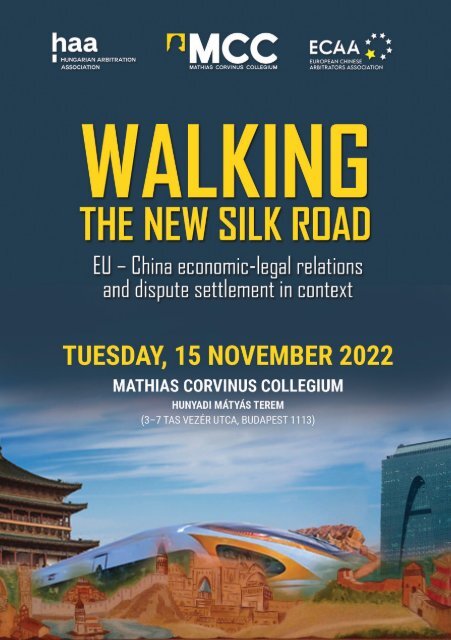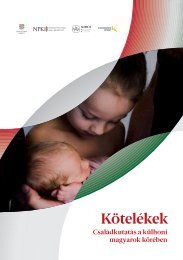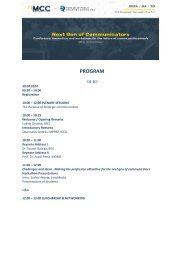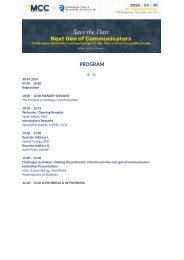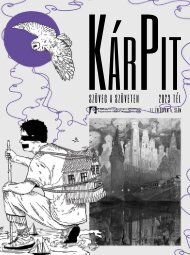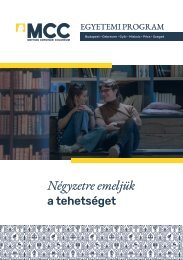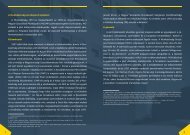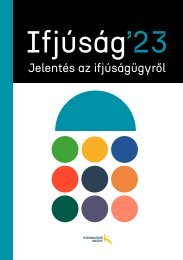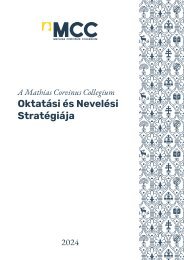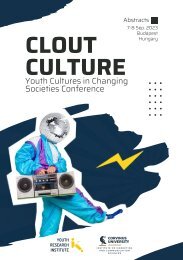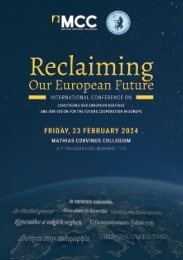Walking the New Silk Road - programfüzet
Create successful ePaper yourself
Turn your PDF publications into a flip-book with our unique Google optimized e-Paper software.
The legendary “<strong>Silk</strong> <strong>Road</strong>” was once a 6500 km long caravan track<br />
that linked China with <strong>the</strong> Roman Empire. It functioned as a crucial<br />
trade route that carried valuable goods and ideas between <strong>the</strong><br />
two great civilizations and allowed a highly lucrative commercial<br />
relation to develop and flourish. One of <strong>the</strong> major objectives of <strong>the</strong><br />
Belt and <strong>Road</strong> Initiative (BRI) is to revive this ancient legendary<br />
route as well as <strong>the</strong> business opportunities it used to offer. The<br />
highly ambitious BRI undertaking aims to improve <strong>the</strong> physical<br />
and digital infrastructure along <strong>the</strong> old “<strong>Silk</strong> <strong>Road</strong>” in order to<br />
promote economic co-operation and enhance trade and investment<br />
flows inter alia between European States and China. With estimated<br />
investments of 900 billion USD, <strong>the</strong> BRI’s implications range across<br />
economic, geopolitical and legal dimensions. The Mathias Corvinus<br />
Collegium, in cooperation with <strong>the</strong> European Chinese Arbitrators<br />
Association (ECAA) and <strong>the</strong> Hungarian Arbitration Association<br />
(HAA), is proud to host <strong>the</strong> “<strong>Walking</strong> <strong>the</strong> <strong>New</strong> <strong>Silk</strong> <strong>Road</strong>” conference<br />
to address and explore some of <strong>the</strong> many complex economic and<br />
legal implications of <strong>the</strong> BRI, as well as <strong>the</strong> role and importance of<br />
dispute prevention and resolution in relation to <strong>the</strong> BRI strategy<br />
between Europe and China. The conference will take a crosscutting<br />
approach to <strong>the</strong>se issues and bring toge<strong>the</strong>r stakeholders<br />
from <strong>the</strong> public and private sectors as well as renowned professors<br />
from academia.<br />
Registration:<br />
feliratkozas.mcc.hu/walking-<strong>the</strong>-new-silk-road-eu-conference
PART I<br />
MORNING SESSION<br />
PART II<br />
PLENARY SESSION (2 PM – 7:00 PM CET)<br />
8:30 – 9:00 Registration<br />
9:00 – 9:10 Welcoming Remarks by Lénárd Sándor (MCC, Head of<br />
Center for International Law)<br />
9:10 – 9:20 Introduction of <strong>the</strong> European Chinese Arbitrators<br />
Association by Alice Meissner (ECAA, MP Attorneys)<br />
9:20 – 9:45 Keynote Speech by Prof. Reinhard Bork (Hamburg University)<br />
Cross-border Insolvency and Arbitration<br />
9:45 – 10:00 Coffee Break<br />
10:00 – 11:30 Panel Discussion I: Sharing Experience on Arbitrating and<br />
Mediating with Insolvent Parties – Tough Questions, Tough Choices<br />
Moderator: Prof. Reinhard Bork (Hamburg University)<br />
Panelists: Prof. István Varga (MCC, Head of Center for Private Law)<br />
Thierry Lauriol (Jeantet, Paris)<br />
Katharina Kitzberger (Weber & Co, Vienna)<br />
Zoltan Fabok (DLA Piper Global Law Firm, Budapest)<br />
Lei Niu (Global Law Office, Shanghai)<br />
11: 45 – 13:30 Lunch Break<br />
14:00 – 14:10 Opening Remarks (MCC Leadership TBA)<br />
14:10 – 14:20 Introductory Remarks I. Hungarian Ministry of Foreign<br />
Affairs and Trade TBA<br />
14:20 – 14:30 Introductory Remarks II: The Honorable Ambassador of<br />
China to Hungary TBA<br />
14:30 – 15:00 Keynote Speech by Prof. M. Sornarajah ( National University of<br />
Singapore)<br />
The “<strong>New</strong> <strong>Silk</strong> <strong>Road</strong>” in context<br />
15:00 – 15:20 Coffee Break<br />
15:20 – 16:40 Panel Discussion II: Trade & investment under <strong>the</strong> BRI<br />
Moderator: Veronika Korom (HAA, ESSEC Business School)<br />
Panelists: David Morris (Vice Chair, UN ESCAP)<br />
Mariann Gecse (Huawei Technologies Hungary)<br />
Csaba Moldicz (MCC School of International Relations)<br />
Gergely Gábor Szabó (ChinaCham, Hungary)<br />
Zoltán Lédig (Ministry of Foreign Affairs and Trade)<br />
16:40 – 17:00 Coffee Break
17:00 – 17:20 Keynote Speech for Panel III by Cui Yang (Deputy of CIETAC EU)<br />
Introduction of CIETAC European Arbitration Centre, <strong>the</strong> BRI’s<br />
Implications for Dispute Resolution and <strong>the</strong> Role of CIETAC<br />
17:20 – 18:40 Panel Discussion III: Dispute Resolution with Chinese Parties:<br />
Opportunities and Challenges<br />
Moderator:<br />
Panelists:<br />
Avi Zamir (Retired Judge, Arbitrator and Mediator, Israel)<br />
Alice Meissner (ECAA, MP Attorneys)<br />
Robin Oldenstam (Arbitration Institute of SCC)<br />
Marianne Kecsmar (PKM, Paris / ICC Court Member for Hungary)<br />
János Burai-Kovács (Arbitration Court of <strong>the</strong> Hungarian<br />
Chamber of Commerce)<br />
18:40 – 18:50 Closing Remarks by Lénárd Sándor (MCC, Head of Center for<br />
International Law)<br />
18:50 – Standing Reception & Networking


